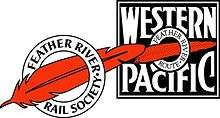Western Pacific Railroad Museum
 | |
 WP FP7 805-A from the Western Pacific Railroad Museum, on display in Sparks, Nevada in 2004. This locomotive once pulled the California Zephyr passenger train. | |
| Reporting mark | FRRX |
|---|---|
| Locale | Northern California |
| Dates of operation | 1984–Present |
| Track gauge | 4 ft 8 1⁄2 in (1,435 mm) standard gauge |
| Headquarters | Portola, California |

The Western Pacific Railroad Museum (WPRM) in Portola, California, formerly known as the Portola Railroad Museum before January 1, 2006, is a heritage railroad that preserves and operates historic American railroad equipment. The museum's mission is to preserve the history of the Western Pacific Railroad and is operated by the Feather River Rail Society (reporting mark FRRX),[1] founded in 1983.[2] It is located at a former Western Pacific locomotive facility, adjacent to the Union Pacific's former Western Pacific mainline through the Feather River Canyon.[3]
Overview

Museum collection
The museum holds in its collection thirty-three diesel locomotives, one electric locomotive, one steam locomotive[4] (under restoration and on display),[5] eighteen passenger cars (including four from the famous California Zephyr train),[6] numerous freight and maintenance cars[7] and sixteen cabooses.[8] They offer excursions and a "Run A Locomotive" program during the summer.[9] The WPRM has one of the larger collections of early diesel era locomotives and freight cars in North America. The museum is often considered to have one of the most complete and historic collections of equipment and materials from a single railroad family. The WPRM is a "hands-on" museum that allows visitors to board and explore locomotives and cars in their collection.[3]
Among the significant pieces in the WPRM collection are Western Pacific 805-A, an FP7 model passenger locomotive that pulled the California Zephyr;[10] Southern Pacific EMD GP9 #2873, nicknamed "the Kodachrome" by the volunteers due to it being painted with the Kodachrome scheme from the failed SP/SF merger; WP 2001, the first GP20 model locomotive (an early turbocharged diesel);[11] WP 501, an early switch engine and the first diesel purchased by the Western Pacific;[12] Western Pacific 0-6-0 steam locomotive 165, an oil burning switch engine built by ALCO in 1919;[5] WP 37, a 200-ton rail-mounted crane, two track clearing snowplows (one wedge type and one rotary); and several rare, early 20th Century freight cars. Also located at the site are the Portola Diesel Shop built in 1953 and an interlocking tower from Oakland, California, currently stored unrebuilt. The Western Pacific Hospital, built in 1911 and one of the few remaining railroad hospitals in the country, was part of the museum until it was destroyed in an arson fire on September 7, 2011. The WPRM prides itself on maintaining several of their road diesels in mainline operating condition and is well known for making occasional movements on Class I railroads using their own historic motive power.
Nearby attractions
The “7 Wonders of the Western Pacific Railroad World” highlight seven key railfanning locations on the Feather River Route of the Western Pacific Railroad in the Feather River Canyon" crossing the Sierra Nevada.[13][14] These sites are west and east of the Museum.
Plumas-Eureka State Park is located nearby, as is the Lassen Volcanic National Park. Lake Davis and Frenchman Lake are popular fishing locations within easy driving of the museum. Graeagle, a town to the west of Portola, is home to vacation cabins and several golf courses.
Operating a locomotive
One aspect of the Western Pacific Railroad Museum is its nationally known Run A Locomotive (RAL) program. Except for winter and certain weekends when special events are in progress, the museum provides visitors a chance to be an engineer for an hour. Participants are given on-the-ground instruction, then they get to operate a real locomotive of their choice for an hour. A qualified engineer joins them in the locomotive for oversight and further instruction.
This is one of the first programs of its type in the United States. More information can be found at WPLives.org. The program is so popular that it is often reserved months in advance.
Zephyr Project
The Zephyr Project is a program of the Feather River Rail Society to acquire, preserve and restore cars, locomotives, personal stories and artifacts relating to the California Zephyr passenger train. Currently, the Project's collection of equipment includes Western Pacific FP7 locomotive 805-A, dome lounge car "Silver Hostel", dome-coach "Silver Lodge" and dining car "Silver Plate". In addition, the dome-coach "Silver Rifle" is on long term loan from the Golden Gate Railroad Museum.
See also
References
- ↑ Railinc, Search MARKs, accessed September 2009
- ↑ "Western Pacific Railroad Historical Society-WPRRH History". Retrieved 2010-06-22.
- 1 2 "Welcome to the Western Pacific Railroad Museum at Portola!". Retrieved 2010-06-22.
- ↑ "Western Pacific Railroad Museum at Portola - Locomotive Roster". Retrieved 2010-06-22.
- 1 2 "Western Pacific Railroad Museum Steam Department". Retrieved 2010-06-22.
- ↑ "Passenger Cars". Retrieved 2010-06-22.
- ↑ "Equipment Roster". Retrieved 2010-06-22.
- ↑ "Central California Rails - Portola Railroad Museum Cabooses". Retrieved 2010-06-22.
- ↑ "Calendar". Retrieved 2010-06-22.
- ↑ "WP 805A". Retrieved 2010-06-22.
- ↑ "WP GP20 History". Retrieved 2010-06-22.
- ↑ "Western Pacific #501". Retrieved 2010-06-22.
- ↑ "Tour 7 - Wonders of the Railroad World" (PDF). Plumas County Visitors Bureau. Retrieved 2008-08-26.
- ↑ "7 Wonders of the Railroad World" (PDF). Plumas County Visitors Bureau. Retrieved 2008-08-26.
External links
- official Western Pacific Railroad Museum website
- The WP 165 Restoration Blog Updates on the restoration of Western Pacific 0-6-0 #165 steam locomotive.
- RailPictures.Net: WPRM – Photographs from the Western Pacific Railroad Museum.
- RailPictures.Net: PRM – More Western Pacific Railroad Museum photographs. (Under the Portola name)
Coordinates: 39°48′13.86″N 120°28′34.46″W / 39.8038500°N 120.4762389°W

